It was back in 1962 that Chiara Lubich, after her first encounters with Christians from various Churches, invited them to get to know one another, offering the spirituality of unity as a common basis for acknowledging one another as brothers and sisters in Christ. Maria Voce highlighted it as she read the five “imperatives” that were formulated in the Catholic-Lutheran Document:
From Conflict to Communion, which was elaborated for the 500th Anniversary of the Reformation. Maria Voce remarked: “They are imperatives which, in my opinion, do not only regard Lutherans and Catholics, but can be practiced by Christians from all the Churches… as an ecumenical undertaking that will be quite worthwhile.” This was also affirmed by Emeritus Bishop Christian Krause, once President of the World Lutheran Federation.
Among the various greetings that were received, the President of the Pontifical Council for the Unity of Christians, Cardinal Kurt Koch, remarks: “The experience of the ecumenism of life shows us that unity grows “walking together” and that walking together means that we are already living and achieving unity.”
The days were spent in an atmosphere of dialogue and mutual acceptance, prayer and sharing experiences of Gospel life from the perspective of unity and openness to the others, experiencing the beauty of Christ’s Church in which the followers of Christ practice what is the very heart of the Gospel: mutual love.
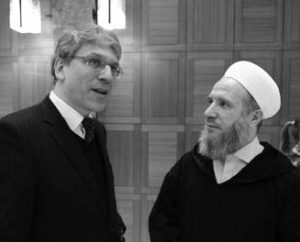
The prayer for unity in the Catacombs of Saint Sebastian in Rome, was much anticipated, where a Pact of Mutual Love (see Jn 13:34) was pronounced so that “this might be the witness brought back into our communities, our countries and societies.” For many people it evoked Pentecost.
But all of this has a foundation: Jesus on the cross who cries out “Why?” Jesus crucified and abandoned who took every division upon himself. When he is recognized and loved – in accordance with Chiara Lubich’s intuition and way of life – he is the key that unlocks unity with God and with our brothers and sisters. This was confirmed in the very touching testimonies from real life.
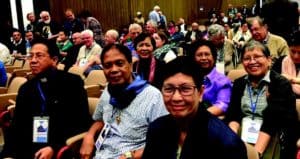
And it was reiterated in a video message by General Secretary Rev. Olaf Fykse Tveit from the World Council of the Churches (WCC). Among other things, he mentioned what had already been expressed in 1925: “The more we draw near to the cross, the more we’ll draw near (to each other) among us Christians.
The interventions of several theologians from different Churches, including Rev. Dr. Martin Robra (WCC): “If we keep Jesus forsaken among us as we walk together on our pilgrimage, we’ll learn together how to reconfigure the past that separates us and see with more clarity where God wants to lead us as disciples of Christ.”
Other interventions of a more theological nature along with experiences from real life, helped to deepen the link between unity and Jesus forsaken in the spirituality of unity, and share the fruits of this ecumenical lifestyle.
The word “dialogue” was mentioned many times as a powerful means for ecumenical unity by Focolare Movement co-president, Jesús Morán, and by Romanian Orthodox Dr. Vasile Stanciu.
Bishop Brian Farrel from the Pontifical Council for the Promotion of Unity Among Christians, highlighted the contribution and the faithfulness of Chiara Lubich, as well as the actions of the Focolare Movement towards a Church of communion.
Encouragement also came from Pope Francis who, during the General Audience on May 10th, publicly exhorted the participants in the Ecumenical Week “to pursue the common path of unity, dialogue and friendship among religions and peoples.”
In conclusion, Metropolitan Gennadios Zervos from Italy, and who is the Ecumenical Patriarchate of Malta, introduced the participants to the experience of communion between Patriarch Athenagoras and Chiara Lubich: “They opened the door of reconciliation between the Churches of the East and the West, and no one can close it,” he declared.
“If we keep Jesus forsaken among us as we walk together on our pilgrimage, we’ll learn together how to reconfigure the past that separates us and see with more clarity where God wants to lead us as disciples of Christ.” (Rev. Dr. Martin Robra, WCC)
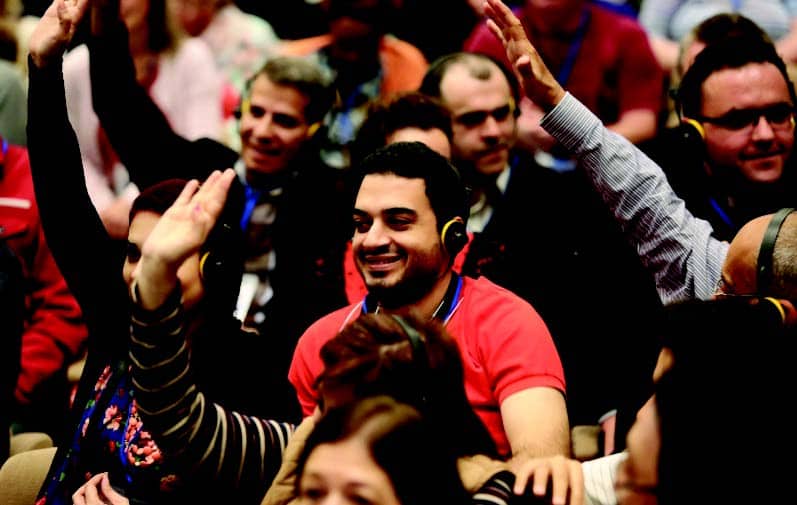 In that context Gennadios presented a “Historic Medal” to the president of the Focolare as a sign of gratitude for what “the charism of unity and love of Chiara has done in history and is still doing today for opening paths of reconciliation and dialogue among the Churches in in the world.”
In that context Gennadios presented a “Historic Medal” to the president of the Focolare as a sign of gratitude for what “the charism of unity and love of Chiara has done in history and is still doing today for opening paths of reconciliation and dialogue among the Churches in in the world.”
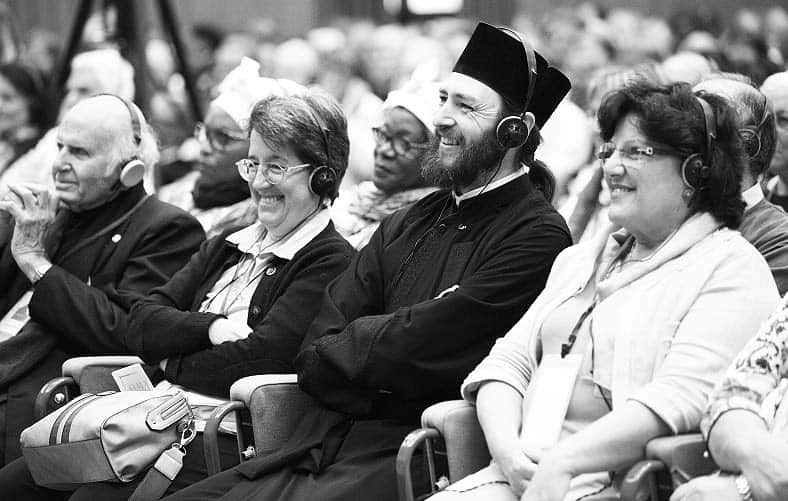 “We’ve built so much together. Now we need to pick up the pace, so that the communion will be visible and complete.” With these words Maria Voce captured the vitality and commitment of a journey that continues.
“We’ve built so much together. Now we need to pick up the pace, so that the communion will be visible and complete.” With these words Maria Voce captured the vitality and commitment of a journey that continues.
IMPRESSIONS FROM THE PHILIPPINE DELEGATES AT THE INTERNATIONAL ECUMENICAL MEETING IN ROME
I have been in past gatherings, but never in one as big as this. Here, I did not feel off tangent, the overriding feeling is to try to see Jesus in the others, because this
is what unites us.I cannot divide, and for me to give Jesus to the others transcends all our differences. Even if some persons have similar attires to us priests, and they are from different churches, we still have a common denominator – we all believe
in Jesus.We can live unity that leads to peace because the message of Jesus is peace. In these days I realized that one of the practical ways of relating to people is through our smiles, where people feel welcomed even if they still don’t know each other. There is no hint of mistrust.
A smile is such a powerful instrument of unity, it speaks volume. Philosophers would usually make long discourses about truth, but here one just smiles and this can melt all distrust. If we had such gatherings in the Philippines, this would remove all prejudices among us. Kindness and love would unite us.
(Msgr. Jerry Bitoon, Laguna)
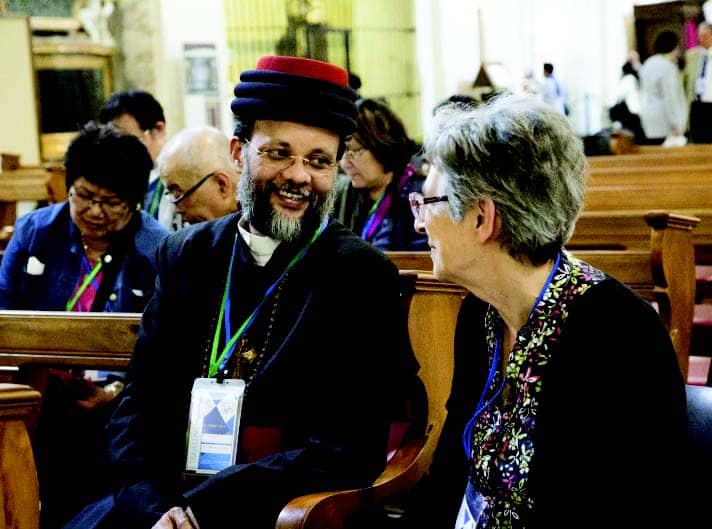
At the beginning of preparations for the trip, I was suffering and had doubts about going on the trip, because my sister who stays with me is sick. But in Rome, my suffering had been turned into joy as I encountered different people who were always smiling and approachable. There were so many people living unity, and I experienced joy because there was Jesus among us.
(Fr. Camilo C. Caabay, Palawan)
After passing some difficulties before arrival in Rome, and having met Jesus Forsaken, I was inspired to go ahead even much more with what we were doing in our area, to love the pastors, priests and leaders of the other churches. Staying with the participants from different churches all over the world,
I experienced their reciprocal love and therefore, felt urged to make myself one with them, especially through listening to them.(Matilde dela Cruz, Laguna)
The experience of encountering Jesus Forsaken in these days is the key to unity in order to have Jesus among us. It is really true that nothing is impossible for God.
(Rosario de Vera, Palawan)
In the Philippines we also have ecumenical fellowship gatherings with Pastors from the different churches. Instead here we journey together with people coming from various churches all over the world. Our meeting started at dinner time. We began by conversing or listening to someone either in front of us or beside us. We got to know one another: what church we belong to or which country we came from. For me this was already dialogue. I realized that this is what Chiara has started, which has now become a big tree with much fruits – a legacy to the church and to the world. This travelling together is a reunion that leads to unity, peace and freedom. (Analyne Rollan, Palawan)
This walk together on a common path is already a big step and an answer to Christ’s prayer to the Father, “May all men be one”. I am amazed at Chiara intuitions that people coming from different cultures, beliefs, creeds and backgrounds, can one day come together in prayer, at meal times, on bus rides, in group meetings, in real fellowship and an atmosphere of family. This to me is good news enough that we can share with the whole world. The Ecumenical Week Celebration was indeed a novelty! There we felt, we saw, and we lived unity beyond borders! Love and understanding flowed among the 700 participants coming from different religions/churches. We felt that this gathering was a step towards the realization of the ‘Ut Omnes’, a fruit of the vision of Chiara that unifies people from all walks of life. The seed that Chiara has sown many years ago, has grown and developed into a big tree which is now bearing fruit as a consequence of the love for Jesus Forsaken. She herself is no longer around, but her legacy – the charism of unity and the Focolare’s being one family – lives on. In essence, the recently concluded Ecumenical meeting has shown the blossoming of what Chiara calls a “new people” walking together towards Christian Unity”. (Norma Valenica, Palawan)




